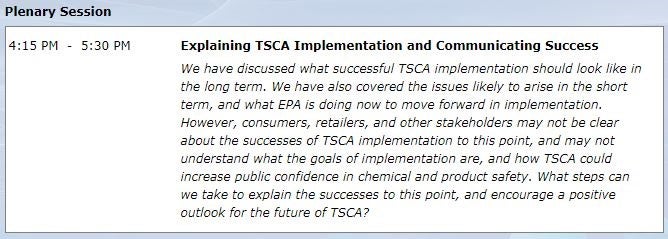Richard Denison, Ph.D., is a Lead Senior Scientist.
Regular readers of this blog know it is our view that, under the Trump EPA, implementation of the 2016 reforms to the Toxic Substances Control Act (TSCA) has pretty much gone off the rails, deviating from what the law requires, failing to reflect the best available science, and not protecting public health. It’s a view shared by, among others, former top EPA officials, members of Congress, state and local governments, labor groups, firefighters, water utilities, public health groups, and a broad range of environmental groups.
But in this era of alternative facts, the chemical industry says that’s because we’re all simply misinformed. And it’s taking steps to correct those alleged misperceptions.
The American Chemistry Council’s (ACC) agenda for its annual chemfest – called GlobalChem – is up online. One of the five plenary sessions for the two-day meeting in March is wholly devoted to the pressing need to figure out how the chemical industry can let everyone know just what a great success TSCA implementation has been:
According to ACC, the problem needing to be addressed is that “consumers, retailers, and other stakeholders may not be clear about the successes of TSCA implementation to this point.” And so it plans to solicit conference attendees’ input on: “What steps can we take to explain the successes to this point, and encourage a positive outlook for the future of TSCA?”
This – from an industry trade association that has spent the last two years grabbing all it can get from an Administration more than happy to give it what it wants. As to the balance and middle ground Congress sought to strike when it passed the Lautenberg Act in 2016? That is soooo 2016.
Far from being an innocent bystander, ACC has been a central actor in the industry’s effort to derail TSCA implementation. To cite just a few examples:
- ACC demanded that EPA lower the fees Congress authorized it to charge industry to help defray the costs of TSCA implementation, which EPA had already significantly understated.
- ACC steadfastly asserts that the 2016 amendments to TSCA made no significant changes to EPA’s reviews of new chemicals, despite massive evidence to the contrary. And it has relentlessly (and successfully) pressured EPA to scale back those reviews, the law be damned.
- ACC abused an exemption it had secured in the new TSCA that removed a group of persistent, bioaccumulative and toxic (PBT) chemicals from expedited restrictions on the basis that they were being subject to expedited review as new chemicals. ACC is now demanding that EPA abandon that approach, start over, and instead review the chemicals under the procedures for review of existing chemicals under TSCA – delaying needed restrictions for many years.
I’ll grant ACC that, at least in the short term, TSCA implementation is succeeding in one respect – giving the chemical industry what it wants. Here are some of the policies the industry argued for that EPA has implemented:
- EPA’s earlier proposed bans on high-risk uses of specific chemicals have either been abandoned or, in one case, delayed and scaled back;
- EPA has not even hinted at using its expanded authority under TSCA to require companies to test, monitor for, or submit existing information on their chemicals – even as EPA declares chemicals with massive data gaps safe for any use;
- EPA is denying public access to companies’ health and safety information in direct contravention of TSCA requirements;
- EPA is ignoring major sources of exposure to chemicals when conducting risk evaluations, greatly decreasing the likelihood of determining there is risk that needs to be regulated;
- EPA is no longer issuing orders imposing restrictions on or requiring testing of new chemicals, and will only rarely even require notification of reasonably foreseen uses;
- EPA won’t address identified risks to workers, instead relying on provisions in new chemical notices and safety data sheets that impose no binding requirements on employers and shift the burden of protection onto workers;
- there is little evidence EPA is reviewing industry claims for confidentiality in a timely and rigorous manner, and it has assigned the unique identifiers required under the law to only a fraction of chemicals whose identities are being withheld from the public; and
- EPA is using methods for weighting scientific evidence that have never been peer-reviewed, deviate from established scientific practice, and are heavily biased toward industry studies.
For the chemical industry, what’s not to like? For the rest of us, not so much.
ACC’s session planners wonder “how TSCA could increase public confidence in chemical and product safety.” That will take a wholesale reset of the course of TSCA implementation towards health-protective regulation far beyond the wishful thinking in which ACC is engaging.










